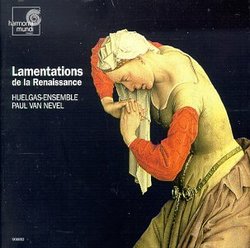| All Artists: Orlande de Lassus, Tiburtio Massaino, Marbrianus de Orto, Robert White, Paul van Nevel, Huelgas Ensemble Title: Lamentations de la Renaissance - Settings of the Lamentations of Jeremiah by Orlando de Lassus, Robert White, Tiburtiano Massaino, and Marbrianus de Orto Members Wishing: 0 Total Copies: 0 Label: Harmonia Mundi Fr. Release Date: 3/9/1999 Album Type: Import Genres: Pop, Classical Styles: Vocal Pop, Opera & Classical Vocal, Symphonies Number of Discs: 1 SwapaCD Credits: 1 UPC: 794881463923 |
Search - Orlande de Lassus, Tiburtio Massaino, Marbrianus de Orto :: Lamentations de la Renaissance - Settings of the Lamentations of Jeremiah by Orlando de Lassus, Robert White, Tiburtiano Massaino, and Marbrianus de Orto
 | Orlande de Lassus, Tiburtio Massaino, Marbrianus de Orto Lamentations de la Renaissance - Settings of the Lamentations of Jeremiah by Orlando de Lassus, Robert White, Tiburtiano Massaino, and Marbrianus de Orto Genres: Pop, Classical
The Lamentations of Jeremiah appear in the old Catholic liturgy only once a year--during Holy Week--yet during the Renaissance and Baroque eras, Lamentations became a separate compositional genre comparable to Masses, Magn... more » |
Larger Image |

 Track Listings (11) - Disc #1
Track Listings (11) - Disc #1